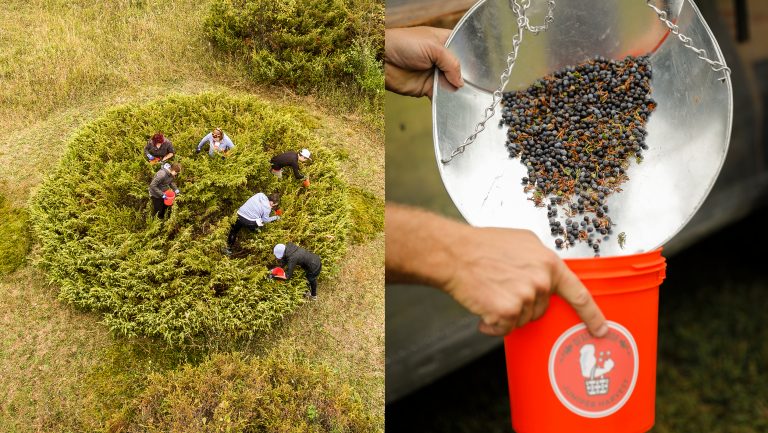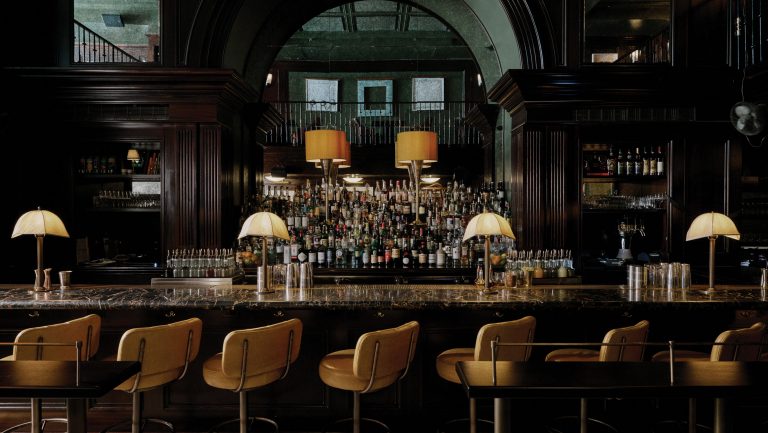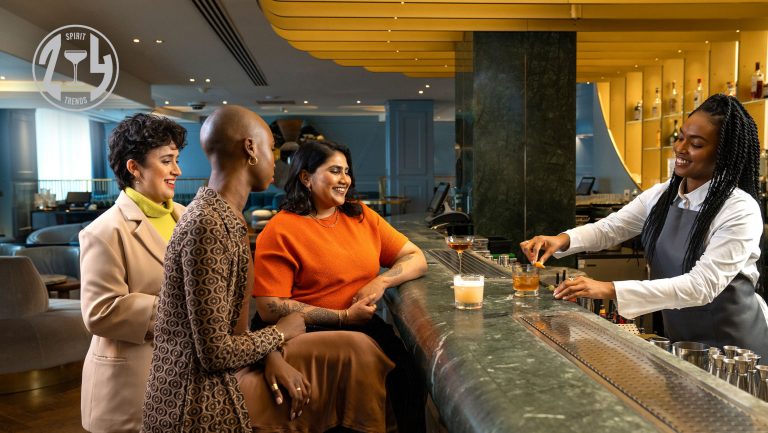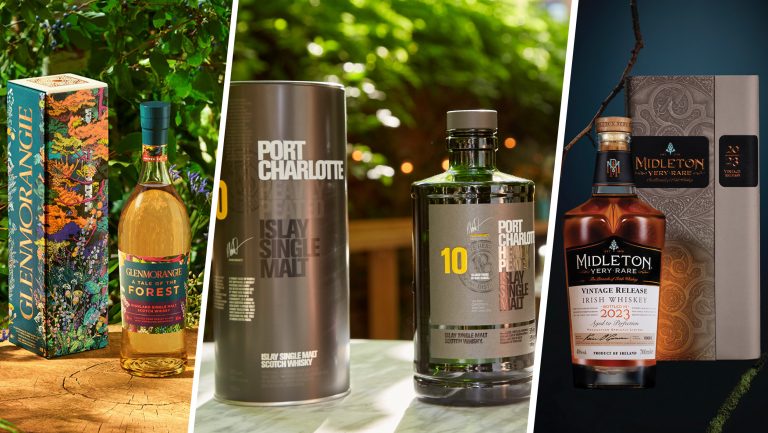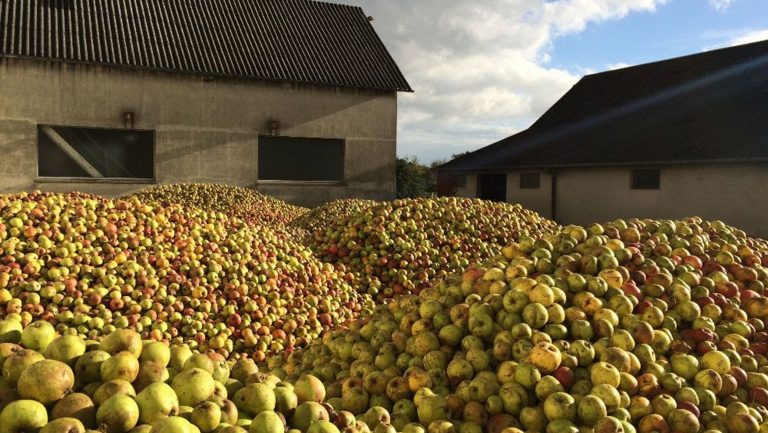On an overcast morning in September on Wisconsin’s Washington Island, a group of about 50 bartenders, kitted out with protective rubber gloves and stiff fabric sleeves, pick through scrubby evergreen bushes, hunting for tiny purply black juniper berries amid the spiky branches. One by painstaking one, they drop the berries into bright orange plastic buckets. By lunchtime, 35 pounds have been reaped, enough to lend their piny essence to 800 bottles of Death’s Door gin.
This yearly event—2017 marked the 10th annual Juniper Harvest hosted by Death’s Door Spirits in Middleton—is more than just a way to coax bartenders into contributing free labor on Greengate Farm, a retired fruit farm converted into a vacation retreat, where a dense field of juniper bushes grows. It’s part of a long-term effort to bring tourism to the small island off the tip of Door Peninsula. And it represents the potential future of locavore gin for U.S. craft distillers.
The Juniper Question: Farmed or Foraged?
Typically, juniper is foraged, not farmed. The scraggly bushes grow wild all over the world, and the ripe berries are usually hand-plucked or beaten from the branches, a slow process. Europe is a prime producer of juniper, with Italy and Macedonia supplying most of the juniper used to make gin, according to Tristan Stephenson’s book The Curious Bartender’s Gin Palace. In addition to the small amount of juniper collected from Washington Island, Death’s Door sources most of its juniper from Bulgaria.

Don’t miss the latest drinks industry news and insights. Sign up for our award-winning newsletters and get insider intel, resources, and trends delivered to your inbox every week.
Wild juniper grows throughout Wisconsin and nearby states, including Iowa, Illinois, and Michigan. “You see it in the bank parking lot, but you don’t know it’s there,” says Susan Ulm, who manages Greengate Farm. “They’re tough bushes—you don’t have to do anything to [take care of] them.”
But what if juniper could be farmed—and harvested—more efficiently? Brian Ellison, the founder and CEO of Death’s Door Spirits, which is based in a suburb of the state capital of Madison, is betting that it can be. He’s working with sustainable-agriculture consultant Ron Doetch to cultivate the wild, prickly plants and create the first commercial crop of juniper, one specifically intended for use in making gin. Toward that end, he’s planting varieties of juniper that are anticipated to lend themselves to more efficient, mechanized picking.
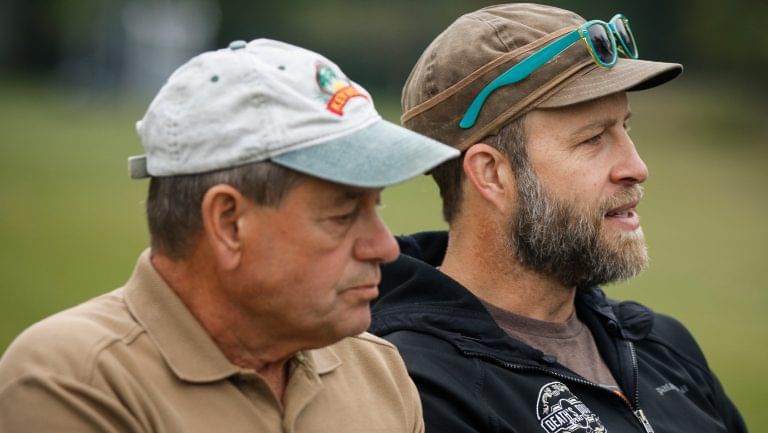
The Backstory
The juniper project has been a long time coming. Ellison has had a lifelong relationship with Washington Island. He spent time there as a child during family vacations, and later as a consultant when he worked with the economic development firm Vandewalle & Associates—a job that indirectly led to his starting Death’s Door.
While working with Vandewalle, Ellison was charged with finding ways to increase tourism on the island, in an effort to bring visitors to a hotel property there that Vandewalle was renovating. That endeavor led him to focus on the island’s agriculture—or more specifically, its lack thereof. At the time, very little was being produced on the island—certainly, not much in the way of crops or related products that might sustain the inhabitants. About 700 people currently live on the 20,000-acre island. (That’s quite a change from the 1900s, when the island sustained a population five times its current size thanks to thriving logging and fishing industries.) Everything had to be imported, usually by boat. Ellison recalls looking around the island and asking, “Why isn’t anyone growing anything here?”
In 2005 he partnered with the Michael Fields Agricultural Institute, a nonprofit organization that specializes in agricultural research and public policy, to have five acres of wheat planted on the island—a variety of hard red winter wheat was selected that would grow well in the maritime conditions there. The next challenge was to find the right product to help monetize the crop. Ellison cycled through ideas, including wheat-based cat litter (but he concluded, “Let someone else be the cat-crap wheat”) and bread and baked goods. Finally, he settled on a beer, and approached Capital Brewery to collaborate on what would become Island Wheat. The brewery sold approximately 70,000 cases in its first year; it went on to become one of the brewery’s most popular releases.
“It was a holy-cow moment,” Ellison recalls. “People care about where their food [and drink] comes from.”
Ellison then started to investigate spirits as an additional way to use the island’s wheat. It’s been a slow build. What was first a mere side hustle—a vodka (launched in 2006) and a gin (made by infusing the same vodka with botanicals and launched in 2007) were contracted by Ellison to be made at an existing facility in Cedar Rapids, Iowa—eventually became his central focus. In 2009, Ellison left Vandewalle to run Death’s Door Spirits full-time, and three years later, he opened the distillery in Middleton. Today the distillery also makes whiskey and a couple of liqueurs, but gin represents 75 percent of its sales.
“From the beginning, Washington Island was the center,” Ellison says. “And getting the farmers to grow wheat was an important component. But where we’ve gone back and doubled down on our investment is with juniper.”
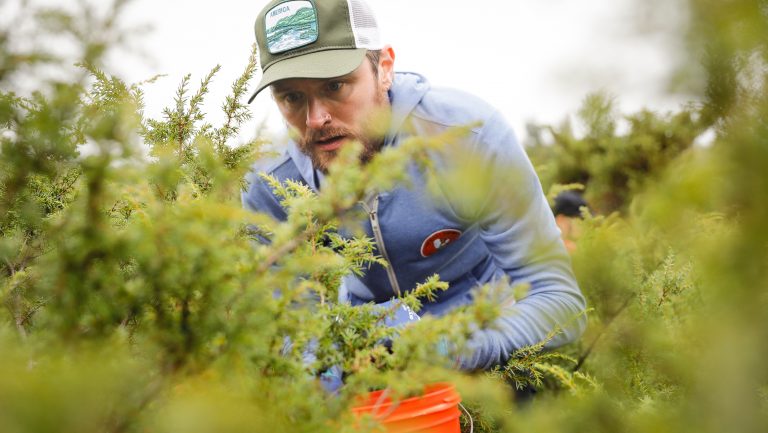
Cultivating the Juniper
As part of that investment, Ellison again brought in Doetch, the sustainable-agriculture consultant, who had been part of the plans to grow wheat.
Roughly 50 acres of juniper already grew freely in patches around the island, Doetch found. But it was the wrong kind of juniper—sprawling plants that grow close to the ground and require slow, laborious harvesting of the berries by hand. Doetsch and his company, Solutions in the Land, came up with the idea to plant a variety of juniper bushes that grow upright and can be more easily harvested using blueberry-picking machines with robotlike “fingers.”
“With human intervention, we can make the uprights thrive, and we can mow it,” Doetch explained. “If we can go mechanical, we can make it a viable commercial crop.”
There are good reasons to cultivate juniper on Washington Island, Doetch says. Although a number of crops grow well on the island—fields of wheat and fragrant lavender line the roadsides—juniper in particular thrives, growing deep roots in the island’s rocky foundation and sandy topsoil. In turn, those roots “hold the island in place,” helping protect it from erosion, Doetch says. “It provides the benefit of conservation of the land.”
Another benefit is that juniper is what Doetch describes as a low-input crop, meaning it doesn’t require irrigation or pesticides. Compared with blueberries, which can cost $5,000 an acre in irrigation, compost, et cetera to produce, a juniper crop costs about $400 an acre.
But, Doetch laments, “the problem with juniper production is time.” It takes 18 months for a juniper plant to produce berries, and it can take two or three years for the plants to become a viable crop. The current crops “will be lush and productive two generations from now,” Doetch says. Luckily, he’s not in any hurry.
“We’re not looking for a quick buck,” Doetch emphasizes. “We’re not going to plant juniper today and be rich in a year. We’re thinking in [terms of] centuries.”
A Future for Locavore Gin?
To be clear, Death’s Door gin isn’t made from a base of 100 percent Washington Island wheat, nor is it flavored with only Washington Island–harvested juniper. But each batch contains at least a little of each.
The precise amount of island-harvested juniper in the gin isn’t the focal point, though, Ellison says, describing the Juniper Harvest as “an economic development project that is trying to bring awareness and opportunities to the people of Washington Island.” In other words, the end goal isn’t to create a booming market for selling pounds and pounds of island-grown juniper berries to the outside world (although it may indeed help raise some money). Instead, Ellison says, it’s a vehicle to help bring people to Washington Island, where tourism and hotels are more likely to bring economic benefit to the islanders.
That doesn’t mean, however, that a fully locally sourced gin will never be a possibility. “That’s our ideal,” Ellison says. To that end, he’s brought representatives from the Department of Agriculture to tour the island, and he’s considered applying for a USDA grant to help move the juniper project forward (a grant was secured to help fund wheat on the island).
It seems unlikely that Death’s Door will be made only with juniper grown on Washington Island anytime soon. “Realistically, there isn’t enough for us,” Ellison confirms—not enough berries, not enough labor, not enough funding. That 35 pounds collected by the bartenders in those bright orange buckets? It represents about 1/50th of what would be needed throughout the year. Even with occasional supplemental harvests, it’s still not enough.
Yet every tidy row of upright juniper trees planted on the island, and every plump juniper berry plunked in a plastic bucket, represents forward movement. It might not be happening today on Washington Island, but for another craft producer somewhere, the idea of a fully locavore gin just came a little closer to reality.

Dispatch
Sign up for our award-winning newsletter
Don’t miss the latest drinks industry news and insights—delivered to your inbox every week.
Kara Newman reviews spirits for Wine Enthusiast magazine and is the author of Shake. Stir. Sip., Nightcap, and Cocktails with a Twist (Chronicle Books).

